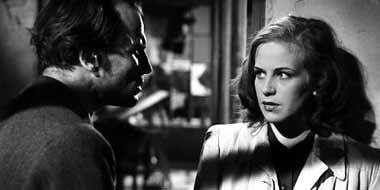The Murderers are Among Us * * * *
 Die Moerder sind unter uns (The Murderers are among us) occupies a special place in popular German film. It is the very first film made after WWII in Germany. It was made in 1946 in Berlin, and it is set against a horrific backdrop of destruction. It's really unfathomable. There is a whole series of films from this time called the "Rubble Films". Rubble, rubble everywhere. Mountains of rubble. Lines of women, only women, with pails move the rubble just to have a way to walk from A to B. I was in Berlin in the mid-1980s and saw parts of town that were clearly rebuilt after being bombed. I went to the museums and saw the photos. But it's much more powerful in film since you see how the rubble was from skyline to skyline, and there is simply no structure standing.
Die Moerder sind unter uns (The Murderers are among us) occupies a special place in popular German film. It is the very first film made after WWII in Germany. It was made in 1946 in Berlin, and it is set against a horrific backdrop of destruction. It's really unfathomable. There is a whole series of films from this time called the "Rubble Films". Rubble, rubble everywhere. Mountains of rubble. Lines of women, only women, with pails move the rubble just to have a way to walk from A to B. I was in Berlin in the mid-1980s and saw parts of town that were clearly rebuilt after being bombed. I went to the museums and saw the photos. But it's much more powerful in film since you see how the rubble was from skyline to skyline, and there is simply no structure standing. Oh, a story. Yes, there is a story. It is a story about a man suffering from post-traumatic stress from having been a part of atrocities. If you say atrocities and WWII, you naturally think of the Holocaust, but this isn't about that. This is about a soldier who witnesses the atrocities in Poland where Hitler waged a war of annilation and where execution of civilians, POWs, and Jews by regular soldiers was widespread. The Eastern front was a vicious war with no regard for human life, and on that front, Poland was especially horrific. Hilter intended to use Poland for expansion of Germany and planned to eradicate the Poles to do it. Of the crimes against humanity presented at the Nurenberg Trials, the non-Holocaust ones are almost all from Poland. There were mass executions of 10,000s of thousands of civilians and POWs at a time. Horrific stuff.
Oh, a story. Yes, there is a story. It is a story about a man suffering from post-traumatic stress from having been a part of atrocities. If you say atrocities and WWII, you naturally think of the Holocaust, but this isn't about that. This is about a soldier who witnesses the atrocities in Poland where Hitler waged a war of annilation and where execution of civilians, POWs, and Jews by regular soldiers was widespread. The Eastern front was a vicious war with no regard for human life, and on that front, Poland was especially horrific. Hilter intended to use Poland for expansion of Germany and planned to eradicate the Poles to do it. Of the crimes against humanity presented at the Nurenberg Trials, the non-Holocaust ones are almost all from Poland. There were mass executions of 10,000s of thousands of civilians and POWs at a time. Horrific stuff.In the film, a young, surprisingly well-fed and healthy, woman returns from a concentration camp to her rubble of an apartment in Berlin and finds it is occupied by a man. The man is the traumatized ex-soldier refered to above. He is exceedingly unpleasant, yet somehow she falls in love with him (huh?). Through her love, he begins to discover that life might actually be worth living. But no smaltzy Hollywood movie is this. No, he's pretty much a cynical, depressed drunk 99% of the time. At one point, an old man in the story gives the nice young woman some good advice: "It's all well and good to try to save someone, but you should not run headlong into disaster to do it." The soldier eventually meets his old commanding officer who ordered the execution of civilians. Now the proper ending for this film would be for the ex-soldier to murder his ex-commanding officer and then commit suicide. This was indeed the original ending, but the powers that be in 1946 didn't think that was the best message to be putting out there to the public. So instead we get a hokey happy ending about seeking justice not revenge -- which isn't hokey at all except that it is within the context of this film. The film is a bitter, dark and biting commentary on society, war, and religion -- and a happy ending doesn't fit.
Bottom-line: This is one of the more memorable films I've seen for a long time. I recommend it to anyone who is interested in Germany, visiting Germany, or WWII.

<< Home